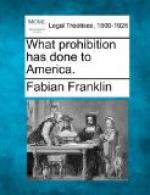legislature is driven to the deliberate enactment
of a law that flies in the face of a mandate of the
Constitution. A possible plan exists, however,
which is not open to this objection, and yet the execution
of which would not present such terrific difficulty
as would the proposal of a simple repeal of the Eighteenth
Amendment. That Amendment imbeds Prohibition
in the organic law of the country, and thus not only
imposes it upon the individual States regardless of
what their desires may be, but takes away from the
nation itself the right to legislate upon the subject
by the ordinary processes of law-making. Now an
Amendment repealing the Eighteenth Amendment but at
the same time conferring upon Congress the power to
make laws concerning the manufacture, sale and transportation
of intoxicating liquors, would make it possible for
Congress to pass a Volstead act, or a beer-and-wine
act, or no Liquor act at all, just as its own judgment
or desire might dictate. It would give the Federal
Government a power which I think it would be far more
wholesome to reserve to the States; but it would get
rid of the worst part of the Eighteenth Amendment.
And it would have, I think, an incomparably more favorable
reception, from the start, than would a proposal of
simple repeal. For the public could readily be
brought to see the reasonableness of giving the nation
a chance, through its representatives at Washington,
to express its will on the subject from time to time,
and the unreasonableness of binding generation after
generation to helpless submission. The plea of
majority rule is always a taking one in this country;
and it is rarely that that plea rests on stronger
ground than it would in this instance. The one
strong argument which might be urged against the proposal—namely
that such a provision would make Prohibition a constant
issue in national elections, while the actual incorporation
of Prohibition in the Constitution settles the matter
once for all—has been deprived of all its
force by our actual experience. So far from settling
the matter once for all, the Eighteenth Amendment
has been a frightful breeder of unsettlement and contention,
which bids fair to continue indefinitely.
I have offered this suggestion for what it may be
worth as a practical proposal; it seems certainly
deserving of discussion, and I could not refrain from
putting it forward as a possible means of relief from
an intolerable situation. But I do not wish to
wind up on that note. The right solution—a
solution incomparably better than this which I have
suggested on account of its apparently better chance
of acceptance—is the outright repeal of
the Eighteenth Amendment. And moreover, the primary
need of this moment is not so much any practical proposal
likely to be quickly realized as the awakening of the
public mind to the fundamental issues of the case
—the essential principles of law, of government,
and of individual life which are so flagrantly sinned
against by the Prohibition Amendment.




